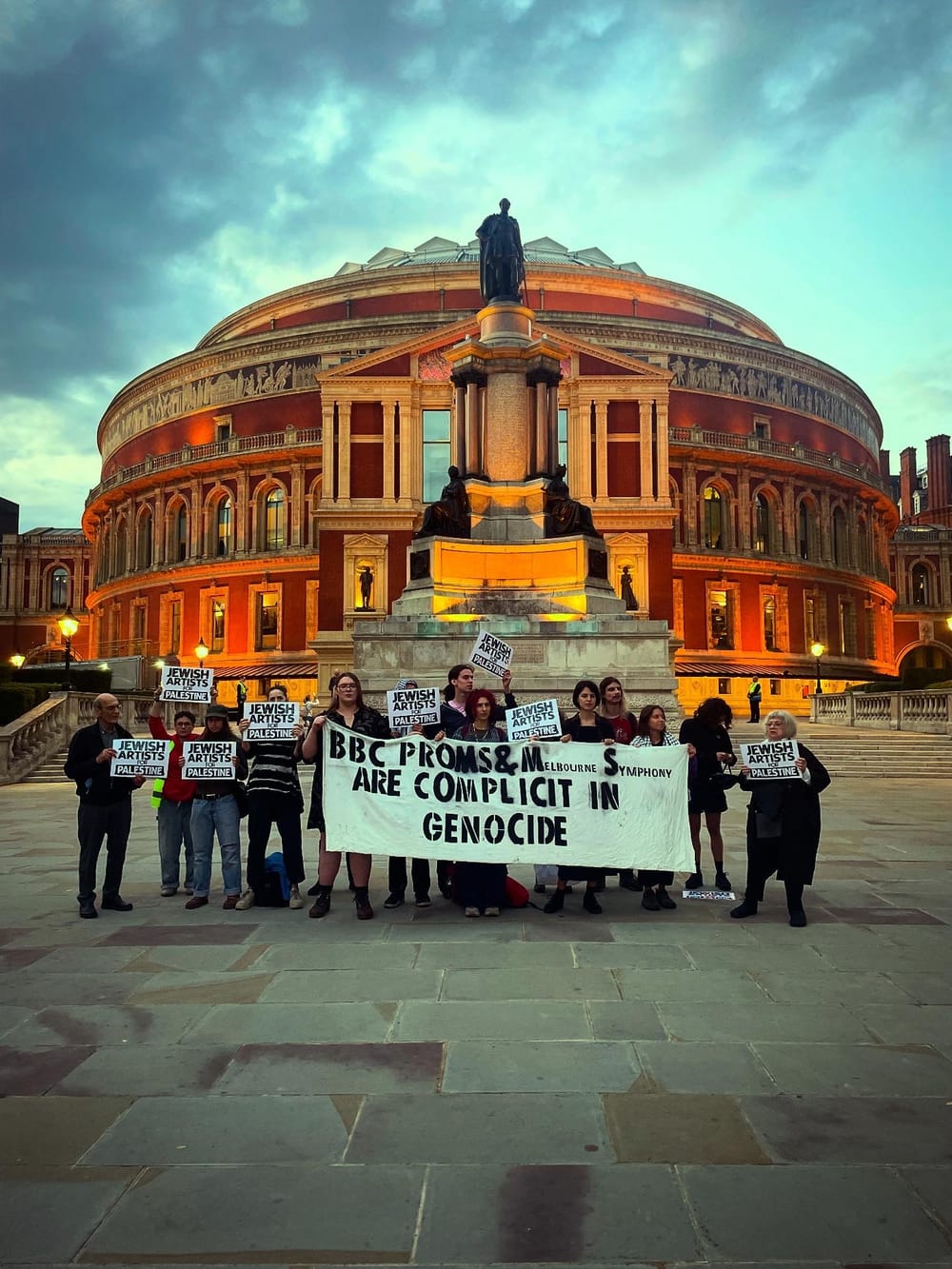Tracing the apocalypse
For Israel and its allies, Iran’s attack has ushered in a new political reality in which Palestinians once again fade from view.

In the early hours of 14 April, sirens blared over the village of Umm al Khair in Masafer Yatta, a southern region of the occupied West Bank.
The warning of an imminent Iranian attack was not, however, intended for Umm al Khair itself which, like many other Palestinian villages in the West Bank, is not connected to a civil siren network. Rather, the alarm rang through Carmel, the Israeli settlement perched on a hillside overlooking the village, just metres away. Unlike these settlers, the residents of Umm al Khair had nowhere safe to shelter, as Israel’s occupation authorities prohibit virtually all Palestinian construction in Area C by systematically denying permits to build.
“Honestly we thought that it was our last night,” said Awdah Hathaleen, a Palestinian peace activist, writer, and English teacher from the village. “We had heard that it seemed like Iran would reply to the Israeli attack, but none of us thought that some of the rockets would be over our village.
“We were just moving and running around, we didn’t know where we’d go,” Hathaleen continued. “The settlers all went to their shelters, but here we don’t even have good houses, so we don’t have shelters. We didn’t know what to do. We have a small room made from concrete, so we moved all the children and the women to that room.
“It was one the worst nights ever for everyone. We hadn’t lived through a situation like this before. We are still scared this will happen again. We don’t have any guarantee that we can protect ourselves.”
The risk of falling shrapnel from collisions overhead was evidenced by news of the night’s one serious casualty, which took place a few dozen kilometres to the south in the Naqab. There, seven-year-old Amina al-Hassouni, from al-Furah, a Palestinian Bedouin village that is unrecognised by the state, also had nowhere safe to shelter. She did not make it out of her home before a fragment of a missile tore through it, and she is now receiving treatment for critical head injuries.
For Palestinians in the West Bank, the hours of rocket fire were only a short interlude from another nightmare: the rapidly spreading and intensifying pogroms carried out by settlers in villages outside of Ramallah, Nablus, Bethlehem, and Hebron. Over last weekend alone, hundreds of settlers – plainly supported by Israeli forces – killed multiple Palestinians, injured dozens, and burned hundreds of homes and cars. Those murdered include Omar Hamed, Jehad Abu Alia, Mohammed Issam Shahmawi, Mohammed Daraghmeh, Abdulrahman Maher Bani Fadel, and Mohammed Ashraf Bani Jame.
This particular spate of settler-state violence began last Friday, after Benjamin Achimeir, a 14-year-old settler, went missing and was later found dead. The pogroms that entailed constitute just one instance of the violent collective punishment and ethnic cleansing that has been raging through the West Bank since 7 October. But to start here is itself misleading, as one must refer to the Naksa and the Nakba before it – and decades of settler-colonial violence prior to that – to see this moment in its full historical context.
This is the material reality which Palestinians in the West Bank returned to, as soon as the settler air raid sirens had gone silent – and that is to say nothing of the unceasing genocide in Gaza. Yet for Israel and its allies, Iran’s attack has ushered in a new political reality dominating domestic and international attention – a reality in which Palestinians once again fade from view.
Re-centring Palestine
Over the past six months, it is clear that we have entered into an unprecedented phase in the pursuit of Palestinian liberation. After years of being silenced and sidelined in their own struggle, the abject horror of Israel’s assault on Gaza – the killing of over 34,000 people, the displacement of 1.9 million others, and the destruction of 62% of homes by occupying forces since last October – has focused the world’s attention on the plight of the Palestinian people. As the genocidal consummation of the Zionist project has become plain, Palestinians have rightly been re-centred as the protagonists in the fight for freedom from the river to sea.
Yet, the escalation of hostilities between Iran and Israel since the start of April – sparked by Israel’s extrajudicial attack on the Iranian embassy compound in Damascus, killing 16 people, including eight officers of the Islamic Revolutionary Guard Corps – risks a relapse into the framing of the Gaza war, and the Palestinian liberation struggle altogether, as a mere proxy for a wider conflict. Indeed, only six months ago, it appeared that Israel was on the verge of cementing the normalisation of relations with the Saudi regime – in line with what has already been achieved with other Arab states through the Abraham Accords – thereby consolidating a US-orchestrated anti-Iranian axis across the region.
Such a regression is, of course, beneficial to the Israeli prime minister Benjamin Netanyahu, who, for more than a decade, has been peddling the line that Israel faces an existential threat from Iran, despite its own military “strength”. Through centring the conflict with Iran, in particular the risks posed by the Islamic Republic’s nuclear capability, Israeli political leaders are effectively able to oscillate between projecting aggression and victimisation in order to advance the state’s interests, above all in Palestine.
A contrived paradox
Netanyahu and the right-wing Zionists in his cabinet stand to gain on a number of counts by this Janus-faced play of the aggressor-victim. First and foremost, as indicated by Egyptian officials, the US government may now have given Israel the green light for its planned assault on Rafah, on the condition it does not engage in a full-scale reprisal against Iran. This would have untold repercussions for the 1.4 million people currently seeking refuge in the southern tip of the Gaza Strip. Israel’s recent purchase of 40,000 tents, enough to reallocate around a third of the population now sheltering in Rafah (to where, who knows?), points to Israel’s ultimate intentions.
The members of Israel’s ruling executive have also been presented with the opportunity of curtailing internal dissent and stabilising their grasp on power, for at least as long as they can maintain a state of collective imperilment. Anti-government protests, which had in recent weeks been building in strength not seen since before 7 October, will likely dissipate, as they have each time Netanyahu has chosen to trigger a war the moment he has sensed his own position becoming acutely vulnerable, thanks to popular sentiment turning against him. This focus on destroying internal opposition aligns with Israel’s intensified efforts to target Israeli and foreign activists on protective presence and documentation shifts in the occupied West Bank through a newly-created unit within the Israeli police.
Further, the resurgent framing of Israel’s existence as being at stake could well derail campaigns to force western governments to rescind arms exports used in the genocide of Palestinians. The evening after Iran’s attack, over 100 Democrats and Republicans issued a letter urging US Speaker of the House of Representatives Mike Johnson – an evangelical Christian Zionist – that a military spending package of $14bn for Israel be put immediately to a vote. Signatories of the letter included politicians, such as Democrat Nancy Pelosi, who a mere two weeks ago signed a letter requesting that President Joe Biden withhold arms transfers until the completion of an investigation into Israel’s strike on the World Central Kitchen aid workers (no such investigation has been completed). A vote will take place Saturday night.
In the UK, the campaign against arming Israel appeared to be gaining popular momentum in recent weeks. Last month, Foreign Affairs Select Committee chair Alicia Kearns was caught on tape telling the audience at a Tory fundraiser that government lawyers had advised an immediate suspension of export licences. And while crowds gathered outside parliament on Wednesday evening to demand this, earlier that day, Foreign Office minister David Rutley MP was in the Commons justifying the continued export of military equipment to Israel on the basis of its right to defend itself against Iran.
This is still about Palestine
Speculation has been growing about the scale and timing of Israel’s response, especially this morning, as news breaks of Iran firing air defence batteries amid reports of explosions near a major airbase in Isfahan province. And while, from afar, we may wager whether or not the next missile that is fired will plunge the region into a long-prophesied Armageddon, one thing for certain is that the apocalypse in Palestine continues unabated. Israeli bombs and shelling are still massacring Palestinians in the north and south of Gaza, as famine spreads throughout. The pogroms rage on in the West Bank, while settlements continue to be constructed there and across East Jerusalem at record pace. Foreign ministers may totter to meetings preaching de-escalation, but return home to continue creating the conditions for genocide with “military aid”. We must not be frozen in place while regional statecraft becomes the dominant narrative, giving cover to disastrous intensification on the ground.
As Hathaleen told us, “Wars mean that you sleep in your house but you have no guarantee that it will still be here tomorrow. You don’t know when you will be arrested. You know nothing.
“We pray to God that this war will not happen and that the war [already] here will stop, because, we the Palestinians are humans. We have lives and we want to live our lives with our families without problems. We want to feel safety.” ▼
Evan Robins is an editor at Vashti.
Eli Machover is a PhD candidate in politics at the University of Oxford and an editor at Vashti.
Authors

Evan Robins is an editor at Vashti.

Eli Machover is a PhD candidate in politics at the University of Oxford and an editor at Vashti.
Sign up for The Pickle and New, From Vashti.
Stay up to date with Vashti.



